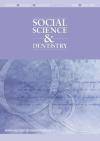Social Science and Dentistry

- Cover Date:
- June 2012
- Print ISSN:
- 2040-4263
- Vol:
- 2
- Issue:
- 1
Testing and developing psychological models for early recognition of (oral) cancer
Objective: This article summarises a seminar given on ‘Testing and developing psychological models for early recognition of (oral) cancer’ presented at the session on ‘Head and Neck Cancer: Early recognition, quality of life and fear of recurrence’ as part of the British Psychological Society Seminar Series on Psychology & Dentistry. The seminar initially outlined the importance of early diagnosis of cancer and stressed the importance of using theory in research aiming to understand the process and timing of help-seeking behaviour. This led to a discussion of the problems with existing theories, with the research into help-seeking behaviour for symptoms of oral cancer used to exemplify these issues. Finally, an outline of a new conceptual framework (the Model of Pathways to Treatment) was presented, with suggestions as to how this can be used to advance future research into early diagnosis of cancer and other diseases. Key points raised in the seminar are outlined in this article. Importance of early dIagnosIs
This focus of this research stems from the link between the stage at which cancer is diagnosed and subsequent prognosis. For many cancer types, diagnosis at an early stage (when tumours are small and localised) is associated with good survival rates and improved morbidity. For example, in the UK, when oral cancer is diagnosed at an early stage, the 5-year survival rate is 80-90%, whereas when oral cancer is diagnosed at an advanced stage (when tumours are large and/or have spread) the 5-year survival rate can be as low as 20% (Pugliano et al., 1999). There are additional detrimental consequences of delayed diagnosis. For instance, treatment of advanced disease often requires more invasive treatment, longer hospital stays, increased healthcare costs and has been found to be associated with reduced quality of life/ psychological well-being (Dolan et al., 1998; Kowalski et al., 1994). It follows that it is essential to identify ways to reduce delays in diagnosis. One explanation for delayed diagnosis of oral cancer is that many patients wait for some time before consulting a healthcare professional after they have noticed oral signs and symptoms (Allison et al., 1998). It is therefore important to understand the reasons behind help-seeking decisions and the timing of healthcare use.
- Article Price
- £15.00
- Institution Article Price
- £
- Page Start
- 39
- Page End
- 41
- Authors
- Suzanne Scott
Articles from this issue
- Title
- Pg. Start
- Pg. End
- Perceptions of Australian Mothers on Infant Teething: A Pilot Investigation Using a Mixed Methods Approach
- 3
- 11
- AFTER and beyond: cancer recurrence fears and a test of an intervention in oral and oropharyngeal patients
- 29
- 38
